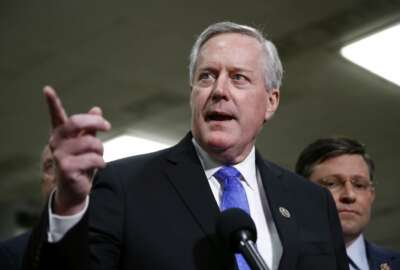
Different stimulus bills from the House and Senate to come
The Senate will craft a stimulus bill very different from that of the House, and U.S. Citizenship and Immigration Services could get bailout help from Congress this...
Best listening experience is on Chrome, Firefox or Safari. Subscribe to Federal Drive’s daily audio interviews on Apple Podcasts or PodcastOne.
The Senate will craft a stimulus bill very different from that of the House. U.S. Citizenship and Immigration Services could get bailout help, and federal agency appropriations bills will advance. That’s just some of the activity one can expect on Capitol Hill this week as lawmakers return from recess. Federal Drive with Tom Temin got a look ahead from Bloomberg Government Editorial Director Loren Duggan.
Interview transcript:
Tom Temin: Loren, looks like a very big agenda coming up now.
Loren Duggan: Absolutely. Lawmakers are coming back from a two-week, at least, chamber break. Committees were pretty busy last week as well. But they’re coming back to town with things that they need to make progress on ahead of the fiscal year starting on Oct. 1, but more immediately, some sort of stimulus package to help keep the economy going as the COVID-19 pandemic drags on. And as you mentioned, this week, we’re awaiting the Senate GOP version of a stimulus bill. We saw that $3.5 trillion package go through the House a couple of months ago, but now Mitch McConnell has used this recess to assemble a bill that he hopes to sell to his members and then unveil to the public this week. It will indeed look different than that House bill, a much smaller price tag, perhaps fewer provisions and the addition of liability language, that has really been a key provision that he has wanted to see in the next round of stimulus.
Tom Temin: Yeah so between zero and $3.5 trillion maybe there’s a number that both chambers can agree on?
Loren Duggan: Absolutely. And of course, the administration, which is going to be a big player here and kind of threw a monkey wrench into things last week by the president saying he wanted the idea of a payroll tax holiday or break brought into the discussions and then a final bill. This is an idea that he’s brought up several times during these rounds of negotiation, and the Hill hasn’t bought at all or bit on that idea. So it’ll be interesting to see if that’s a true line in the sand, that if a bill doesn’t have that he won’t support it, or if Republicans and Democrats on the Hill agree on something that omits that revision, if he’ll go along with it. So that could be a sticking point, as these bills are unveiled and discussed over the coming weeks.
Tom Temin: And appropriations for the fiscal 2021 year – that’s pretty much a House affair at this point.
Loren Duggan: It is. The House Appropriations Committee used the last two weeks to get through all 12 of its bills through subcommittee through full committee, get bill numbers and everything and reports filed. So what we’ll see this week is the first package, it’s four bills dealing with the State Department, Agriculture Department, military construction, and Interior and EPA and other agencies in there. In general, the way the markups went is probably what we’ll see on the floor. Democrats have put extra money in that doesn’t count against the spending caps into all 12 bills to try and provide extra funding to agencies or, for example, in the Veterans Affairs part of the funding bill to ensure that the VA MISSION Act programs which are programs that help veterans receive care outside of the traditional VA system – that money provided to those doesn’t count against the spending caps negotiated last year. Republicans weren’t keen on that approach. They voted pretty much lockstep against the bills or said they wouldn’t support them when they go to the floor. We’ll see if that’s what pans out this week. But this is a pretty big step to get all 12 bills out and markers for the coming negotiation. But the four bills we see this week probably aren’t going to be what becomes law after the Senate gets involved here.
Tom Temin: Got it, and what about appropriations are a loan almost for U.S. Citizenship and Immigration Services, which is telling 13,000 employees they might be furloughed otherwise?
Loren Duggan: Right and this is a issue that touches places around the country too, because their centers are spread out. So we’ve seen bills that pair a Missouri Democrat and a Nebraska Republican trying to get some sort of money into the system to prevent those furloughs. It’s – the issue here is that a lot of the USCIS programs are fee funded and fees aren’t coming in so you don’t have the money to spend. So I could see that being one of the issues that comes up in the stimulus talks. There’s always an outside chance that they move on individual bills as we’ve seen some of these smaller incremental fixes, the problems around the government caused by coronavirus. But I would see, I would think that would be something that many members will be agitating for, again, partly because it’s across the country that this is going to affect.
Tom Temin: We’re speaking with Bloomberg Government Editorial Director Loren Duggan. And there’s also in the Senate side moving back there a major confirmation vote this week on someone who has a lot of influence on what happens in federal agencies.
Loren Duggan: Absolutely. Russ Vought, who’s been the acting director of the Office of Management and Budget for some time, when Mick Mulvaney was who was still officially OMB director moved up to chief of staff. But his confirmation vote is scheduled for 5:30 p.m. today, and that will, you know, give him the full title, no longer acting. But in the wings as a vote on the Deputy Director Derek Kan, votes tomorrow and Wednesday in different committees in the Senate that have jurisdiction, so we might see his deputy confirm this week as well. So moving on from the acting status for those officials to full directors of OMB.
Tom Temin: And then there’s a detail bill here that is asking the State Department to come up with a plan for getting around its backlog of passport applications. And not that anyone’s going anywhere overseas, but people do have, there’s a couple of million, I think applications, that piled up while the State Department’s offices were closed.
Loren Duggan: Right, this is a bill by Gerry Connolly, who’s the Virginia Democrat and very influential on the Oversight Committee, as well as the full chairman of that committee, Carolyn Maloney. What they’re trying to do is get, as you say, a plan from the State Department for how you’re going to reduce this backlog. We know that there can be backlogs of processing and we’ve seen it in other agencies as well, but this one feels pretty acute. So you could see that come up as a separate bill or again, I think this coronavirus stimulus package as it’s being negotiated, you could see language like that inserted just to try to force action by the State Department. Pompeo, the secretary of State is due to come up to Capitol Hill this month. Wouldn’t be surprised if he gets questioned by lawmakers as well when he’s there about this issue.
Tom Temin: And is there going to be a statue and bust clearing going on on Capitol Hill because of Confederate people that are in statues and busts?
Loren Duggan: There is going to be a debate at least this week in the House. Steny Hoyer said that he would bring up a bill that would affect not just the Confederate statues and I think by accounts, there’s 11 statues in Statuary Hall that have some sort of tie to the Confederacy, whether it’s Gen. Robert E. Lee, or Jefferson Davis, who was the president. But it would also go against statues that weren’t people necessarily associated with Confederacy, but were noted for their white supremacy beliefs. And then one of the busts –
Tom Temin: Like Woodrow Wilson, maybe?
Loren Duggan: More like a what’s, one of the names, Charles Aycock, who’s a, you know, some long ago figures. One is Vice President John C. Calhoun, who obviously was pro-slavery as well. So that’s more controversial because you’re getting to a former vice president. But one of the things he wants to take out is Roger Taney, the former Supreme Court Chief Justice who wrote the Dred Scott decision. His bust is in the Supreme Court chamber. And he’s a Marylander, Steny Hoyer, as was Roger Taney, but the idea here is to replace him with Thurgood Marshall, another famous Marylander. So this debate I think will go on for a while. We’ve also seen Confederate base names come up in both the Defense authorization bills that are in the House in the Senate, and in some of the spending bills. So this debate will continue. It’s a very emotional one for some folks, and we’ll have to see what the ultimate resolution is.
Tom Temin: Maybe they’ll appropriate money for a museum to contain statues of people we no longer revere?
Loren Duggan: Well, in some cases, what they’re offering here is if they do take the statues out that they will allow the states to get them back if they want them or perhaps even work with the Smithsonian for some sort of resolution, because the statues that they’re talking about here were submitted by states throughout the last hundred-some-odd-plus years. And they could replace them with other people and some states are already debating that.
Tom Temin: Loren Duggan is editorial director of Bloomberg Government. Thanks so much.
Loren Duggan: Thank you.
Tom Temin: We’ll post this interview with FederalNewsNetwork.com/FederalDrive. Subscribe to the Federal Drive at Apple Podcasts or Podcastone.
Copyright © 2025 Federal News Network. All rights reserved. This website is not intended for users located within the European Economic Area.
Tom Temin is host of the Federal Drive and has been providing insight on federal technology and management issues for more than 30 years.
Follow @tteminWFED
Related Stories





